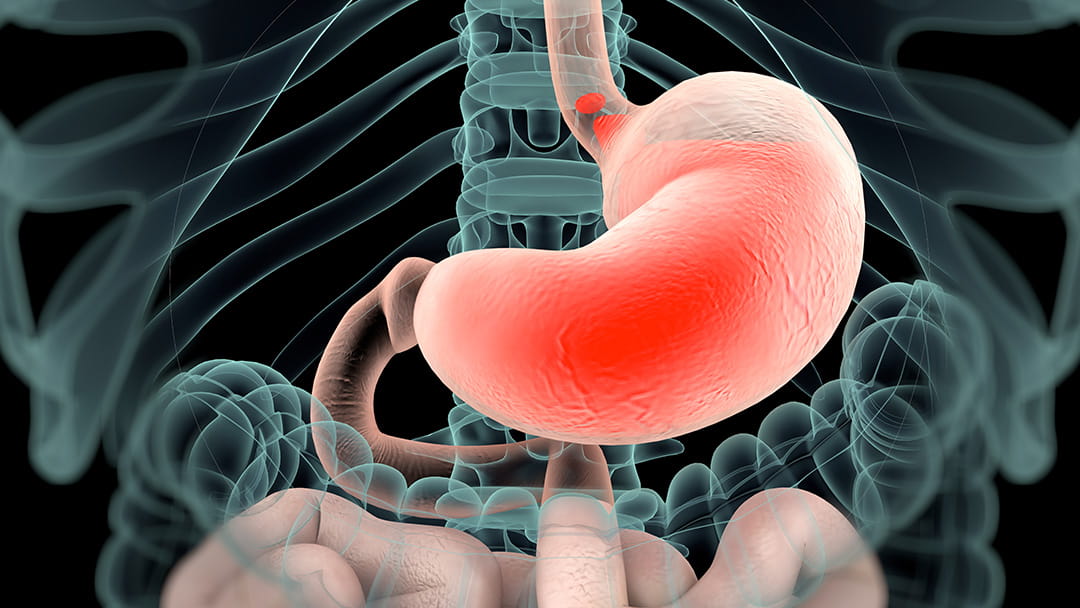How To Prevent and Find Relief From Acid Reflux
July 27, 2021

Acid reflux is a common and costly problem. Some of the top-selling over-the-counter medicines in the United States are for relief from stomach acid backing up into the esophagus. Most people think of acid reflux as simply heartburn, but it’s important to know whether you have acid reflux that is mild or severe.
Occasional, mild heartburn can be managed with dietary changes or by taking occasional antacids such as Tums. But severe reflux involves frequent, bothersome symptoms that may include heartburn, regurgitation, sore throat and difficulty swallowing, says UH gastroenterologist Dany Raad, MD.
Severe reflux is known as GERD – short for gastroesophageal reflux disease – which requires stronger medication than antacids. Chronic GERD, left untreated, can lead to a number of complications. It can damage tissues of the esophagus and lead to lung and throat problems, tooth decay from excessive acid and a precancerous condition of the lining of the esophagus called Barrett’s esophagus.
Causes of Severe Acid Reflux
Certain foods such as chocolate, coffee, fatty foods, tomato products and citrus may stimulate heartburn. But they aren’t the cause of reflux disease, Dr. Raad says.
“There are several factors responsible for increased risk of reflux disease,” Dr. Raad says. They include obesity, which exerts pressure from the belly on the stomach, and overeating. Another risk is hiatal hernia, where part of the stomach pushes through the diaphragm.
“The other big risk factors are alcohol and smoking,” he says.
Medications for Acid Reflux
Two types of medication that reduce stomach acid are H2 blockers (Pepcid, Tagamet, for example) and proton pump inhibitors (Nexium, Prilosec). Both types are available over the counter or by prescription. Proton pump inhibitors are the stronger of the medications.
They are very effective, but long-term use of proton pump inhibitors has raised concerns about potential side effects, including fractures, pneumonia, kidney disease, cardiovascular disease and dementia.
Dr. Raad says the risk of long-term side effects is uncertain, and there is good evidence that the medications are safe over the long term if taken properly. The risk of side effects is a concern when people take over-the-counter proton pump inhibitors on their own without medical guidance, he said.
“A lot of patients take these medications without a prescription, often for the wrong reasons,” he says. “If people are taking these medications for longer than three to six months on their own, they should be consulting a doctor. They should know for sure they are taking the medication for the right indication and most important, they should know they are on the right dosage. If that’s being done, the risks of taking the medication are way less than the benefit it provides.”
For patients who don’t want to take medications long-term, or whose symptoms don’t respond to medications, surgical options are available. The most common is a laparoscopic procedure called Nissen fundoplication, which reinforces the sphincter between the esophagus and stomach, preventing acid from backing up.
How To Manage Acid Reflux
Dr. Raad offers these tips to prevent and manage acid reflux:
- Lose weight if you’re overweight.
- Avoid foods that trigger reflux, such as coffee, chocolate, soda and fried foods.
- Eat smaller amounts.
- Don’t smoke. Cut back on alcohol.
- Raise the head of your bed so your head and chest are above the level of your stomach. But don’t stack pillows, which can cause head and neck problems. Place bricks or commercial bed risers under the frame or use a wedge pillow.
- Avoid late-night snacking, which contributes to reflux. Don’t eat two to four hours before bedtime. That’s the time it takes to digest food.
Related Links
University Hospitals’ experienced team of specialists offers innovative diagnostics for all stages of GERD. Learn more about treatment for gastroesophageal reflux disease at UH.
Tags: Over-the-Counter Drugs, GERD, Men’s Health


